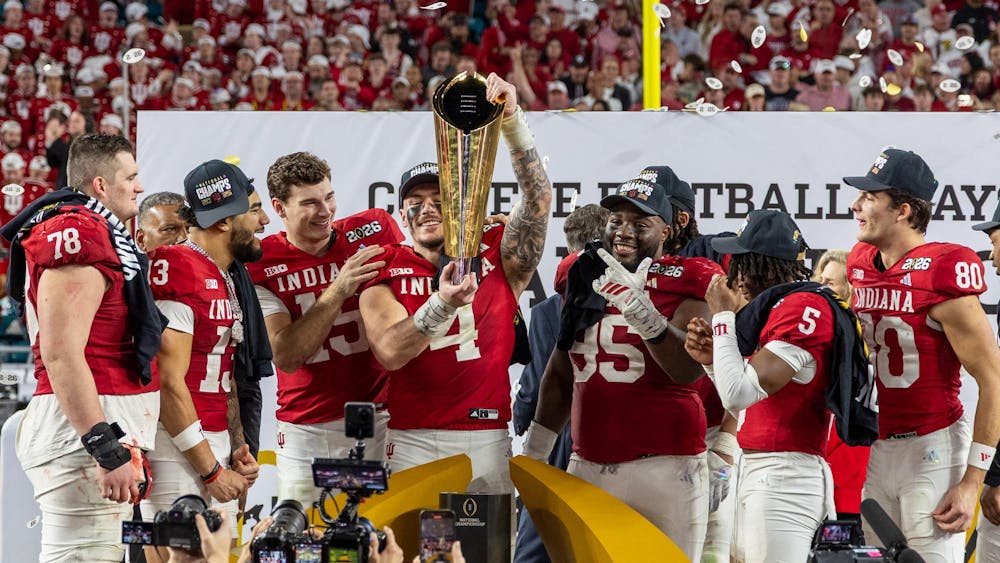Should Indiana’s General Assembly approve adequate funding for the proposed IU Life Sciences Initiative, 100 faculty researchers will be hired at the University over the next two years. \nBut even as the legislative process continues to progress, Ron Walker, president of the Bloomington Economic Development Corporation, said it was still too early to predict whether the University’s appropriations proposal would be successful. \nIU President Adam Herbert originally proposed a two-year, $80 million funding plan to subsidize the rapidly developing University life sciences. But as this year’s legislative process continues, the current budget proposal calls for the University to receive only about half of that amount. This proposal was accepted a month ago in the House Ways and Means Committee, but still awaits further approval. \nPerhaps an indication of the University’s perceived importance of developing IU’s health sciences, trustees created a new position to oversee its development: vice president for life sciences. \nDr. Craig Brater, dean of the IU School of Medicine, took up reigns on the project in December 2005. As the first vice president for life sciences, Brater has worked to stir support for the proposal. \nBrater, like Walker, remains cautious in making predictions about the fate of life-science funding. However, a self-proclaimed “pathological optimist,” Brater said he has confidence in elected policymakers.\n“I believe there that there is a lot of thoughtfulness at the legislative level that will result in them funding us to a substantial degree,” he said. \nWhile life sciences’ potential returns seem to entice politicians and academics statewide, Indiana is not alone in developing these research capabilities. \nBoth Brater and Walker acknowledged that several states compete for top life science programs and sought after scientists. Both agree that the reason Indiana could be better suited to support the potential influx of life science startup companies is because the state has already developed a sturdy foundation for health-science growth. Walker predicted the plan’s success because he said it strengthens an industry the state already has. \nAside from Indiana, Brater said several areas had already emerged as leaders in the life sciences. He described some nationwide markets as ahead of Indiana, but was confident the state could surpass their successful endeavors. In naming just a few, he called Pittsburgh, the San Francisco Bay area, San Diego, Seattle and metropolitan New York as developed hotbeds for life-science activity. \n“Part of this is that you are trying to take away business from these (other) places,” Brater said, demonstrating that a certain amount of competitive mindedness was required for such a plan to succeed. \nSpecifically, he named three reasons why he thought Indiana could overtake other, more-established markets: a research conducive university environment; Bloomington’s affordable cost of living; and the state’s already “well-developed” infrastructure. \nSpeaking in-depth on Indiana’s infrastructure, Walker said Indianapolis-based Eli Lilly and Company has been a “large reason” Indiana has even become involved with life-science research. In addition, he cited several smaller companies that have also served to excite interest and develop health-science infrastructure across the state.\nWith Interim Provost Michael McRobbie’s confirmation as IU’s next leader three weeks ago, one question would inevitably arise: Would McRobbie follow in Herbert’s life science-supporting footsteps? \nBrater believes so. So far, he said, McRobbie has contributed considerable “encouragement” toward life-science efforts. Even with the change in leadership, Brater said he does not foresee a change in life science’s direction.\nSince his confirmation, McRobbie has made clear his desire to rejuvenate IU’s humanities curriculum. Even with the newfound humanities attention, life sciences supporters have said they do not believe Bloomington research or Indiana’s economic development would be hindered. \nWalker, a strong supporter of health-science economic development, said he even supports plans to inject life into the University’s humanities programs. In recruiting top researchers, he said, many of these potential scientists would potentially find the arts-infused culture appealing that an invigorated humanities program could bring about.\n“(Bloomington) is not just a community that has great jobs, but great culture,” he said, adding that McRobbie was “wise to see the connection.”
Life-science plan awaits OK
IU could hire 100 faculty within next 2 years
Get stories like this in your inbox
Subscribe





